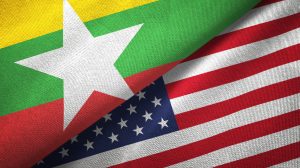The United States will not immediately replace Thomas Vajda, its outgoing ambassador to Myanmar, to avoid inadvertently conferring legitimacy on the country’s military government, Nikkei Asia reported late last week.
According to the December 8 report, Vajda, who will leave his post prematurely this month, will be replaced instead by the current deputy chief of mission, Deborah Lynn, who will serve as chargé d’affaires “ad interim.”
A spokesperson for the U.S. State Department told Nikkei that Lynn “will assume duties as charge d’affaires at [the] U.S. Embassy Rangoon upon Ambassador Vajda’s departure.”
The measure is designed to preserve a U.S. diplomatic foothold inside the country, while avoiding any action that might be interpreted or presented as legitimizing the military junta that took power in February 2021.
Vajda was appointed to the post in November 2020 and presented his credentials to President Win Myint on January 19, 2021, less than two weeks before the coup d’etat, which overthrew the National League for Democracy government, and ensconced in power a military-backed junta calling itself the State Administration Council (SAC).
Compared to Derek Mitchell and Scot Marciel, the two ambassadors who preceded him, who served in the country for about four years each, Vajda is leaving his post having served less than two years. It is unclear whether the decision to cut Vajda’s term short was a personal decision, or an active decision by the U.S. State Department to downgrade its representation.
In comments given to the U.S.-funded broadcaster Radio Free Asia, another State Department spokesperson implied the former, stating that Vajda had spent most of his posting inside Myanmar without his family. “Most of the time he’s spent there has been after the coup,” the spokesperson said. “He wasn’t expecting that going in. Then the coup happened.”
Regardless of what explains the timing, the decision not to appoint a fully credentialed ambassador represents a passive way of signaling its opposition to the repressive military junta, against which the U.S. government has imposed repeated rounds of economic sanctions.
The move by Washington returns Myanmar another incremental step toward the relative diplomatic isolation that prevailed under military rule before the 2010s. As Radio Free Asia noted, this represents a de facto return to the U.S. position toward Myanmar prior between 1987 and 2012, when it was represented by a chief of mission rather than a fully credentialed ambassador. The U.S. reinstated full diplomatic relations after the by-elections of April 2012, which saw Aung San Suu Kyi elected to parliament for the first time, giving her imprimatur to the military’s program of phased economic and political opening.
Australia made a similar decision earlier this year, when it was reported that the country’s Department of Foreign Affairs and Trade has selected a “senior career officer with ambassadorial experience in the region” to succeed former ambassador to Myanmar, Andrea Faulkner, who wrapped up her term in April. According to a report by the ABC, the new appointee “will not present her credentials to the head of the junta and will instead operate as the head of mission with the title of chargé d’affaires.”
The United Kingdom also chose to take the same route, although more actively, downgrading the status of its ambassador-designate Pete Vowles to avoid him having to present his credentials to the SAC. This prompted a four-month standoff during which the military junta refused to accept Vowles’ appointment and told the U.K. government to send an alternative candidate. In July of this year, Vowles announced that the junta had expelled him from the country.
































